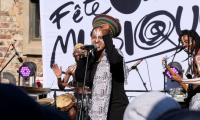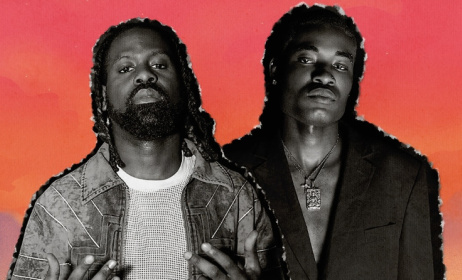Hip-hop in Cameroon
By Dzekashu MacViban
Contrary to other popular musical genres in Cameroon like Bikutsi, Makossa, Soukous and Bend-skin, which are celebratory in nature and chronicle relationships, sex and society, hip-hop as a subculture, whether in Africa or elsewhere, has typically been about resistance. According to Clark (2012), hip-hop “has allowed African youth to participate in social, political and economic discourse on a national and global level”. This overview text tracks its origins in Cameroon, the key figures in its development and its current status.
 Stanley Enow, hip hop artist from Cameroun. (ph) panelle.com
Stanley Enow, hip hop artist from Cameroun. (ph) panelle.com
The roots of hip-hop in Cameroon
While Bikutsi and Makossa, as Nyamnjoh and Fokwang argue, “owe their popularity to the emergence and patronage of the Biya regime from 1982”, it took almost two decades for hip-hop to establish itself and become as popular as the aforementioned genres. This is because from the very beginning, hip-hop in the 1980s was a marginalised genre associated with angry youths, even though this was not always the case with pioneering artists such as Benjo, Stars System, Mc Olangué, Krotal, Bashiru, Ak Sang Grave and Rage 2 Z-Vil, among others.
In 1998, Louis Tsoungi purchased a recording studio, and alongside Paul Edouard Etoundi and Patrice Bahina started Mapane Records in Yaoundé in 2000. It emerged as one of the most important music labels of the 2000s, producing artists such as Krotal, Ak Sang Grave, Bashirou, Ebene and Phatal among others. The first album to be released under this label was Yaounde Pour La Planete in 2002 by Ak Sang Grave. Another pioneering label which emerged was Zomloa Records, created by DJ Bilik, which produced artists such as Sultan Oshimihin, Shaman, Sumanja, and 1.9.8.5. In addition, Red Zone, another influential label based in Douala, emerged in the second half of the millennium and was the brainchild of Bobby Shaman (Ze Marien Claude), Sultan Oshimihin and Sharlee Ngango.
Key figures in the evolution of hip-hop in Cameroon
Krotal (Paul Edouard Etoundi Onambélé) remains one of the best-known pioneers of hip-hop in Cameroon. He started as a member of Anonym and Magma Fusion (a collective of various groups), which participated in Rencontres Musicales de Yaoundé (R.E.M.Y) in 1997, and opened act for Senegalese group Positive Black Soul during their Cameroon and Senegal tours. In 2003, Krotal released his debut album, Vert Rouge Jaune, which was well received and included popular tracks like ‘Jamais’ and ‘Vert Rouge Jaune’, followed in 2012 by La BO de nos Life. In May 2007, Krotal founded Ndabott Prod', a label that is currently working with artists such as Abaracadabra, JaHel MineliH, Cyrille Nkono and Krotal himself.
When Sadrak and the Sassene brothers (Evindi and Sundjah) decided to form Negrissim’ in 1995, little did they know that they’d created what would become one of Cameroon’s most influential hip-hop crews, which would later win accolades from Senegal to France. Boudor later joined the group. In 2000 they released their first album, Appelle Ta Grand-Mère, which chronicled life in Yaoundé, Cameroon’s capital, highlighting everyday occurrences and dreams of the millennium in a language close to that used on the streets, but not devoid of poetry and wordplay. In 2002, after two years on the road, Negrissim’ relocated to Dakar, a decision partly influenced by increased measures to censor their music in Cameroon. Their journey on the road as well as their experience in Senegal would heavily influence the content of their second album in 2009, La Vallée des Rois, which many consider to be the quintessential Negrissim’ release. Their 2012 album, The Bantoo Plan, Vol. 1, highlights their eclectic, experimental style, as well as the maturity of voices steeped in the alternative and underground musical style that has become their trademark.
The release of Rap-El in 2012 highlighted Boudor’s faithfulness to his militancy and role of social crusader who is always highlighting political shenanigans. This former member of Negrissim’ shows no compromise in his spoken word texts and highlights social issues happening from Burkina Faso to Douala. His music label Boudorium Prod. is very much involved in the production and dissemination of Cameroonian music, and has recently produced artists like Duc Z and Sahvane.
In 1999, Ayriq Akam teamed up with MH to form a group called Feu Rouge (red light). His interaction with Mr Ndongo (DJ Str’ss) greatly expanded his music repertoire. In 2000, he featured on a mixtape produced by DJ Str’ss entitled Micro Sauce, Tomate. After a brief hiatus in 2001, he continued writing spoken word and rap texts. In 2004, after he became disillusioned by his former label, Dark Cell, he launched the label Self Service with his friend Ismael. It was under this label that he released the album Puzzle in 2010, which included the hit track ‘Bienvenu au Cameroun’. The label was operational up to about 2012. Later, in 2014, a change in ideology and musical direction led Akam to create Bangando Dream, another label, which reflects his musical maturity as well as a desire to return to African influences and samples. His new musical project, which saw the release of an EP, Prelude to Hello, reveals his desire to create constructive music for an African audience that is reflective of the modern African socio-political experience.
A strong interest in rap led Valsero (Abe Gaston) to form a group with Bachirou in the 1990s called Ultimatum, which operated for a little over three years before splitting in 1997. He returned to rap in 2002 and formed a group called K'ROZ'N, which was made up of his childhood friends Asan and Holmes. Frustration, rage and unemployment led Valsero to write the songs ‘Ce pays tue les jeunes and ‘Ne me parlez plus de ce pays’, which rapidly became very popular, especially among the disillusioned youth who could identify with the harsh realities in his songs. His 2008 album, Politikement Instable, was avoided by most TV and radio stations because they feared the repercussions of airing his overtly political content. Other hip-hop artists whose lyrics are usually full of socio-political commentary include Ra-Syn and Sultan Oshimihin.
With a style that blurs the boundaries between spoken word, hip-hop and rap, Koppo (Patrice Minko’o) was among the earliest artists to experiment with spoken word poetry with the release of his 2004 album, Je Go, which drew on Camfranglais and other street slang and succeeded in challenging mainstream hip-hop.
Lady B (Rosine Mireille Obounou)’s albums Ma Colère and La Fille Beti established her as a leading female voice in hip-hop, the path she choose to follow after turning away from dance, her first love. She has featured in festivals from Johannesburg to Libreville, and was recently part of a multidisciplinary performance called ‘Crossing the Boundaries of Doubt’. Another leading lady in local hip-hop is Krucial Kate, who after recording her first track in 2003 went on to collaborate with Kondom Z, Black J-Gy and Parol. She was later featured in a documentary recounting her search for a musical stardom, produced by Malo Pictures. Her style is a complex mix between RnB, hip-hop, rock and Afro-pop.
Z-Lex’s resourcefulness as an artist and producer is without doubt relevant, as seen in his production of songs like Duc Z’s ‘Je ne donne pas le lait’ and Steveslil’s ‘Ebangha’. Apart from being the CEO of Lastland Records, he also a songwriter and performs in Pidgin French and English. Other Cameroonian indie labels whose roles should not be ignored include: Empire Company, Motherland Empire, MuMak, Red Eye Entertainment, Chillen Muzic Entertainment, aMusic and Warrior Records. In the media, Tito Valery’s work as a TV and radio host has been very instrumental in the dissemination and evolution of hip-hop, a career that started in 2002 when he interrupted an internship at a law firm to work with Radio Equinox. He later worked with STV for 8 years, hosting more than half a dozen influential art shows.
Cameroonian hip-hop today
Jovi (Ndukong Godlove) remains a reference point so far as modern sampling in Cameroonian music is concerned. Before his arrival, no artist sampled beats as extensively as he did - a phenomenon that sparked controversy on the internet when he sampled Congolese legend Tabu Ley Rochereau on the song ‘Pitie’ because the Cameroonian audience was not used to sampling in music. ‘Don 4 Kwat’, Jovi’s lead single from the album HIV (released by the label MuMak in 2012) marked a turning point in Pidgin English rap and was a smash hit, paving the way for ‘Pitie’, which featured on DJ Edu’s Destination Africa show on BBC 1Xtra for more than 12 weeks. Jovi’s label, New Bell Music, is at the forefront of social media marketing with revolutionary methods and a unique professionalism, an approach that has contributed to the rising notoriety of Reniss, whose EP Afrikan Luv is a unique blend of Afro-pop and hip-hop. The album explores complicated issues of love and faith and flaunts its African-ness on almost every level - thematically, linguistically and stylistically.
Undoubtedly the most popular hip-hop song to have emerged in recent years is Stanley Enow’s ‘Hein Pere’ (2013) from his EP Tumuboss. The video is the most viewed by a Cameroonian artist on YouTube, and Stanley went on to win a MTV Africa Music Award in the Best New Act category in 2014 - the first Cameroonian to win the award.
Despite its status as a latecomer among Cameroonian musical genres, two decades since it first emerged, hip-hop has undergone a series of transformations and today is no longer associated with disgruntled youths, but rather with social consciousness and musical innovation.
References & Further Reading
- Clark, Misa Kibona. 2012. “Hip hop as Social Commentary in Accra and Dar es Salaam”. African Studies Quarterly 13(3):23-24.
- Nyamnjoh, Francis B. & Jude Fokwang. 2005. “Entertaining Repression: Music and politics in Postcolonial Cameroon.” African Affairs:245.
- Onambélé, Paul Edouard Etoundi. “Les Musiques Urbaines au Cameroun de 1983 à nos Jours.” (Unpublished Ministry of Culture Document)
- Wakai, Kangsen Feka. “A New Chapter in the Kamer (Cameroon) Hip-Hop Files: A Review of Jovi Le Monstre’s H.I.V (Humanity is Vanishing)”. Bakwa Magazine <http://bakwamagazine.com/2013/04/26/music-review-a-new-chapter-in-the-kamer-cameroon-hip-hop-filesand-there-was-jovi-le-monstre-a-review-of-h-i-v-humanity-is-vanishing/>
[i] Roughly translated from French as “This country kills its young”.
[ii] Roughly translated from French as “Don’t talk to me about that country”.



































Comments
Log in or register to post comments